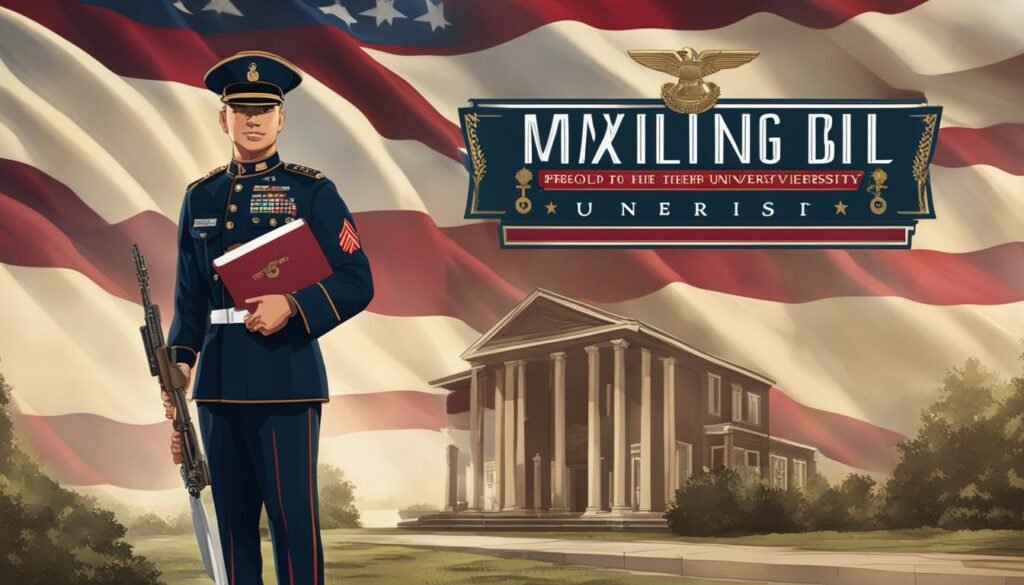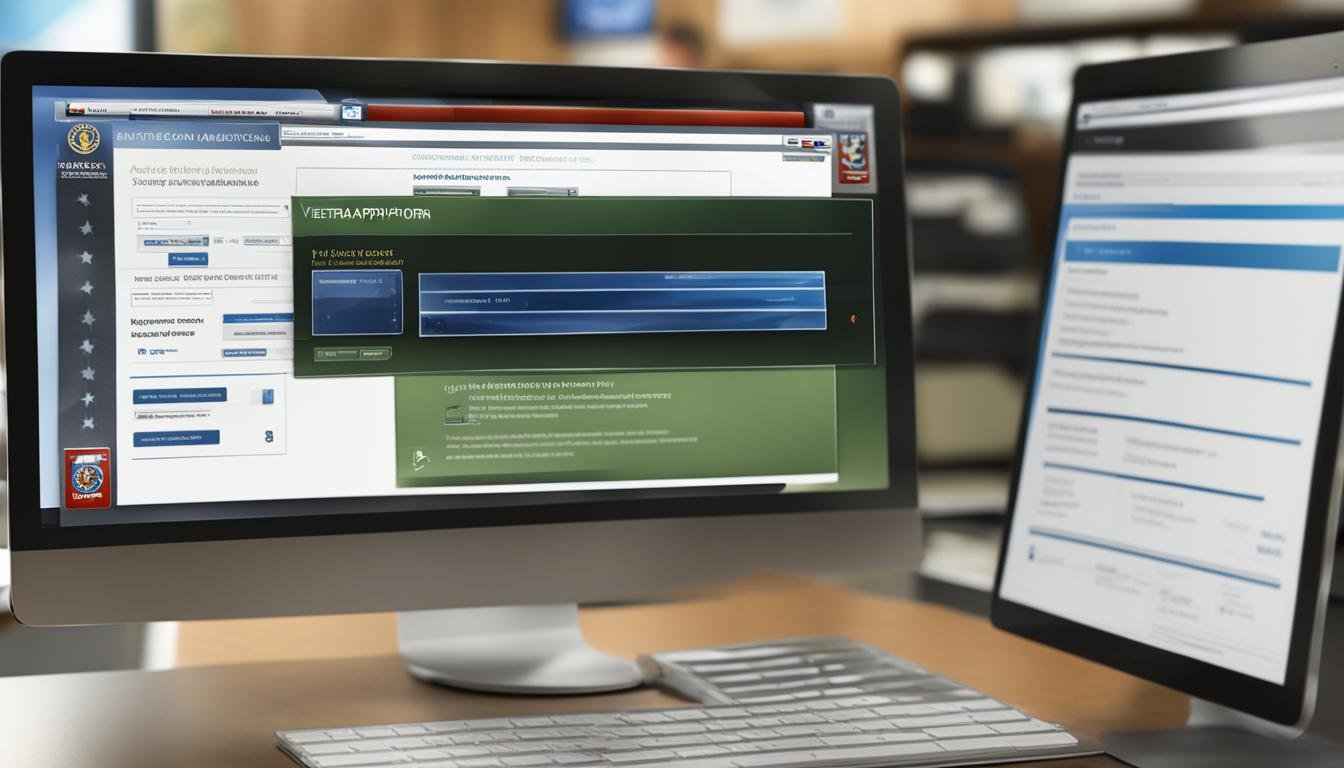Welcome to our comprehensive guide to the GI Bill for veterans. The Post-9/11 GI Bill is a generous education benefit that provides various resources to service members and veterans. With payment of tuition and fees, a monthly housing allowance, and a stipend for textbooks and supplies for up to 36 months, the GI Bill aims to support veterans in pursuing their educational goals.
Key Takeaways:
- The Post-9/11 GI Bill offers tuition and fee payment, housing allowance, and textbook stipend for veterans.
- Eligibility for the GI Bill is based on the amount of time served on active duty since September 10, 2001.
- Understanding the eligibility criteria is crucial for veterans planning to utilize the GI Bill for college education.
- Veterans can maximize their GI Bill benefits by choosing the right educational pathway and exploring online education options.
- Veterans need to stay informed about changes in the GI Bill and how they may impact their benefits.
Understanding the GI Bill Benefits for College Education
As a military personnel or veteran, it’s important to understand the benefits and eligibility criteria of the GI Bill for college education. The GI Bill provides educational assistance to eligible service members and veterans, helping them achieve their academic goals. To fully utilize this program, it’s crucial to have a clear understanding of how it works.
GI Bill Eligibility Criteria
The eligibility for the GI Bill is based on the amount of time served on active duty since September 10, 2001. The VA uses a scale to determine the percentage of benefits a veteran can receive based on their length of service. Generally, veterans who have served at least 36 months of active duty are eligible for the maximum benefits.
In addition to military personnel, the GI Bill benefits can also extend to the children and spouses of service members who died in the line of duty. These individuals may be eligible for education assistance through the GI Bill program.
GI Bill Benefits for College Education
The GI Bill benefits for college education include payment of tuition and fees, a monthly housing allowance, and a stipend for textbooks and supplies. The amount of these benefits varies based on factors such as the veteran’s length of service, the type of educational institution they attend, and the location of the school.
By utilizing the GI Bill, veterans can pursue higher education without the burden of excessive student loan debt. It opens doors to a wide range of educational opportunities, enabling veterans to gain new skills and advance their careers. Whether they choose to attend a traditional college or pursue online education, the GI Bill benefits can provide the financial support needed to succeed.
| Benefits | Full-Time Students | Part-Time Students |
|---|---|---|
| Tuition and Fees | 100% coverage | Pro-rated based on enrollment |
| Monthly Housing Allowance | Based on location | Pro-rated based on enrollment |
| Textbook and Supplies Stipend | $1,000 per year | Pro-rated based on enrollment |
Table: Comparison of GI Bill benefits for full-time and part-time students.
It’s essential for military personnel and veterans to be aware of the GI Bill benefits they are entitled to. By understanding the eligibility criteria and the range of benefits available, individuals can make informed decisions about their educational pursuits and take full advantage of the opportunities provided by the GI Bill.
Tips for Maximizing GI Bill Benefits

As a veteran, it is important to maximize your GI Bill benefits to make the most out of your educational opportunities. Here are some tips to help you navigate the process and get the most from your GI Bill benefits:
1. Choose the Right Educational Pathway
When utilizing the GI Bill, it’s crucial to choose an educational pathway that aligns with your career goals. Research different programs and schools to find the best fit for your interests and aspirations. Consider factors such as program reputation, accreditation, and job placement rates. By selecting the right educational pathway, you can optimize your time and resources while making significant progress towards your career objectives.
2. Take Advantage of Available Resources
There are a variety of resources available to assist veterans in maximizing their GI Bill benefits. Make use of career counseling services provided by your school to explore different career paths and develop an educational plan tailored to your goals. Additionally, seek out scholarship opportunities specifically designed for veterans, as they can supplement your GI Bill benefits and reduce the financial burden of education.
3. Explore Online Education Options
One of the key advantages of the GI Bill is the ability to utilize it for online education. Online programs offer flexibility and convenience, allowing you to balance your educational pursuits with other commitments, such as work or family responsibilities. Research accredited online programs that align with your career goals and ensure they meet the eligibility criteria for GI Bill benefits. By exploring online education options, you can make the most of your GI Bill benefits while maintaining a flexible schedule.
4. Stay Informed About Changes
The GI Bill program undergoes changes and updates from time to time. It is essential to stay informed about these changes to understand how they may impact your benefits. Regularly check official VA websites and other trusted sources for updates on eligibility criteria, payment rates, and any policy changes. By staying informed, you can ensure that you are making informed decisions and taking full advantage of the benefits available to you.
With these tips in mind, you can effectively maximize your GI Bill benefits and make the most of your educational journey as a veteran.
| Tip | Description |
|---|---|
| Choose the Right Educational Pathway | Research and select a program that aligns with your career goals. |
| Take Advantage of Available Resources | Utilize career counseling services and explore veteran-specific scholarships. |
| Explore Online Education Options | Consider accredited online programs for flexibility and convenience. |
| Stay Informed About Changes | Regularly check official VA websites for updates on eligibility criteria and policy changes. |

The GI Bill has undergone several updates and changes throughout its history, impacting the benefits available to service members and veterans. Navigating these changes is crucial to ensure veterans understand the options available to them and make informed decisions regarding their education. In this section, we will compare the Post-9/11 GI Bill and the Montgomery GI Bill to provide a comprehensive understanding of the changes and benefits associated with each.
Comparing the Post-9/11 GI Bill and Montgomery GI Bill
The Post-9/11 GI Bill, enacted in 2008, provides education benefits to individuals who have served on active duty for at least 90 days since September 10, 2001. This bill offers a range of benefits, including coverage of tuition and fees, a monthly housing allowance, and a stipend for books and supplies. Veterans may also transfer their benefits to dependents.
The Montgomery GI Bill, established in 1984, provides benefits to veterans who have served on active duty and contributed to the program during their military service. This bill offers monthly payments based on the length of service and program of study, as well as an enrollment fee paid during active duty.
It’s important for veterans to compare these two bills and determine which one aligns best with their educational goals and personal circumstances. While the Post-9/11 GI Bill is often the preferred choice for its comprehensive benefits, veterans who contributed to the Montgomery GI Bill may find it advantageous to continue utilizing that program.
| Post-9/11 GI Bill | Montgomery GI Bill |
|---|---|
| Benefits include tuition and fees, monthly housing allowance, and stipend for books and supplies | Benefits include monthly payments based on length of service and program of study |
| Transferability of benefits to dependents | No transferability of benefits |
| No enrollment fee | Enrollment fee paid during active duty |
Comparing the benefits and eligibility criteria of these two bills will enable veterans to make well-informed choices that align with their educational and financial goals. By understanding the options available and the changes that have occurred in the GI Bill, veterans can navigate these programs effectively and make the most of their educational benefits.
Applying for the GI Bill
Applying for the GI Bill is a simple and straightforward process that can be completed either online or in person at a VA regional office. To get started, gather all the necessary information about your military background, education history, and the school you plan to attend. This includes your dates of service, discharge paperwork, and any relevant transcripts or documentation.
Once you have all the required information, visit the official GI Bill website or the VA regional office nearest to you. Follow the step-by-step instructions provided on the website or by the VA representative to complete your application. Be sure to double-check all the information you provide for accuracy before submitting your application.
After you have submitted your application, the VA will review it and determine your eligibility for GI Bill benefits. You will receive a certificate of eligibility that outlines the benefits you are eligible to receive based on your service and educational goals. This certificate is an important document that you may need to present to your school’s financial aid office or registrar to access your GI Bill benefits.
| Documents Needed for GI Bill Application | Additional Information |
|---|---|
| DD Form 214 | A copy of your DD Form 214, Certificate of Release or Discharge from Active Duty, which verifies your military service. |
| Education History | Transcripts or documentation from any previous educational institutions you have attended, including high school, college, or technical schools. |
| School Information | The name, address, and contact information of the school you plan to attend, including the specific program or degree you wish to pursue. |
| Banking Information | Your banking information is required if you wish to receive your GI Bill housing allowance and stipend via direct deposit. |
It’s important to apply for the GI Bill as early as possible to ensure a smooth transition into your chosen educational program. By following the step-by-step guide and providing all the required information, you can begin your educational journey with the support of the GI Bill.
GI Bill Benefits for Part-Time Students

The GI Bill is a valuable resource that supports veteran education, not only for full-time students but also for part-time students. Veterans who have other commitments or prefer a more flexible schedule can still take advantage of the benefits provided by the GI Bill.
When it comes to part-time students, the GI Bill offers a reduced payment rate based on their rate of pursuit. This means that the amount of financial support they receive will be adjusted according to the number of credits they are taking compared to a full-time course load.
Although the payment rate may be lower for part-time students, it is still a significant benefit that can help alleviate the financial burden of education. Regardless of their enrollment status, part-time students can still receive funds to cover tuition and fees, a monthly housing allowance, and a stipend for textbooks and supplies.
By supporting part-time education, the GI Bill acknowledges the diverse needs and circumstances of veterans. Whether they are balancing work, family responsibilities, or other commitments, the GI Bill recognizes the importance of providing access to education for all veterans.
GI Bill Benefits Comparison for Part-Time and Full-Time Students
| Benefits | Full-Time Students | Part-Time Students |
|---|---|---|
| Tuition and Fees | Full coverage | Pro-rated coverage |
| Housing Allowance | Based on full-time status | Pro-rated based on rate of pursuit |
| Textbook and Supply Stipend | Full amount | Pro-rated amount |
As shown in the table above, part-time students still receive essential benefits. Although the amount may be adjusted, they can still benefit from financial assistance for tuition and fees, housing allowance, and textbooks and supplies.
By offering support for part-time students, the GI Bill ensures that veterans have the flexibility to pursue their education in a way that fits their individual circumstances. Whether they choose to attend school part-time or full-time, the GI Bill is there to provide the support they need to achieve their educational goals.
Conclusion
The GI Bill is a comprehensive guide to educational benefits for service members and veterans. By understanding the eligibility criteria, maximizing benefits, and navigating changes, you can effectively utilize the GI Bill for your ongoing education.
With its payment of tuition and fees, monthly housing allowance, and stipend for textbooks and supplies, the GI Bill provides valuable support for veterans seeking to further their education. Whether you choose to pursue a full-time or part-time education, the GI Bill offers benefits tailored to your needs.
By following the step-by-step guide to applying for the GI Bill, you can easily submit your application online or in person at a VA regional office. Once approved, you will receive a certificate of eligibility outlining the benefits you are eligible to receive.
Overall, the GI Bill is a comprehensive and valuable resource for veterans. It offers a wide range of benefits to support your educational journey. Whether you’re looking to pursue a college degree or obtain additional training, the GI Bill is designed to help you succeed. Make the most of your GI Bill benefits and embark on your educational path with confidence.
FAQ
What is the Post-9/11 GI Bill?
The Post-9/11 GI Bill is a generous education benefit for service members and veterans that includes payment of tuition and fees, a monthly housing allowance, and a stipend for textbooks and supplies for up to 36 months.
How is eligibility for the GI Bill determined?
Eligibility for the GI Bill is determined by the amount of time served on active duty since September 10, 2001. The VA uses a scale to determine the percentage of benefits a veteran can receive based on their length of service.
Can children and spouses of service members who died in the line of duty receive GI Bill benefits?
Yes, children and spouses of service members who died in the line of duty may be eligible for GI Bill benefits.
How can veterans maximize their GI Bill benefits?
Veterans can maximize their GI Bill benefits by choosing the right educational pathway and taking advantage of available resources.
What changes have been made to the GI Bill?
The GI Bill has undergone several updates and changes throughout its history. Veterans need to stay informed about these changes and understand how they may impact their benefits.
How can veterans apply for the GI Bill?
Veterans can apply for the GI Bill online or in person at a VA regional office. They will need to provide information about their military background, education history, and the school they want to attend.
Is the GI Bill limited to full-time students?
No, the GI Bill is not limited to full-time students. Part-time students can also benefit from the GI Bill, albeit with a reduced payment rate based on their rate of pursuit.
How can the GI Bill support veteran education on a part-time basis?
The GI Bill provides benefits for part-time students, allowing them to pursue education while receiving support from the GI Bill.



